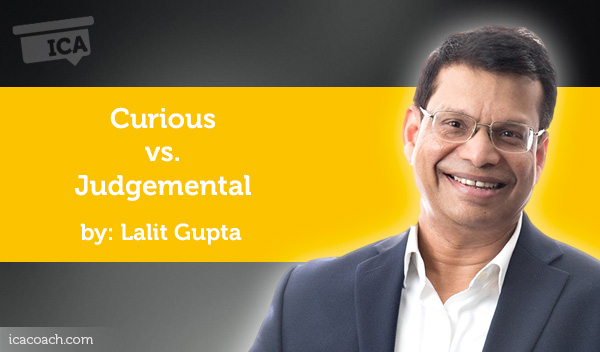
A Coaching Power Tool Created by Lalit Gupta
(Executive Coach, MALAYSIA)
Be curious, not judgmental.– Walt Whitman
Being curious and non-judgemental is at the core of being a good coach. It is about being able to see the situations, people and things as they are, as opposed to seeing them through our own biases, experiences and perspectives.
Do you jump to conclusions rather easily? Is your mind usually made up before you hear all the facts, so you usually don’t even listen to them? If you answered yes to either of these questions, you may be more judgmental than you realize. While no one necessarily likes to admit that they evaluate and label others, sometimes it happens so subconsciously that you don’t even know you’re doing it.
Judgments are ingrained so deeply in our subconscious, it can be hard to break the habit of immediately creating a label or generalization toward a person or situation. We tend to automatically judge things as good or bad, right or wrong, fair or unfair, important or unimportant, urgent or non-urgent and so on.
Self-Application
How do we move from being judgemental to being curious or non-judgemental?
Take a pause
If you find yourself being judgmental, stop yourself. This takes a greater awareness than we usually have, so the first step (and an important one) is to observe your thoughts for a few days, trying to notice when you’re being judgmental. This can be a difficult step. Remind yourself to observe.
Once you’re more aware, you can then stop yourself when you feel yourself being judgmental. Then move to the next step.
Empathise
Instead of judging someone for what he’s done or how he looks, try instead to understand the person. Put yourself in their shoes. Try to imagine their background. Try and explore and understand their backstory. Everyone has one. If not, try to imagine the circumstances that might have led to the person behaving or reacting in the way they do.
Accept
Once you begin to understand, or at least think you kind of understand, try to accept. Accept that person for who he is, without trying to change him. Accept that he will act the way he does, without wanting him to change. The world is what it is, and as much as you try, you can only change a little bit of it. It will continue to be as it is long after you’re gone. Accept that, because otherwise, you’re in for a world of frustration.
Practice mindfulness
Whether you’re new or old to mindfulness, you’ve likely heard the definition that it is a “intentional non-judgmental awareness of the present moment.” The practice of mindfulness is to create focus on your breadth or body sensations, and if your mind wanders then bring it back to your subject of focus. The more you practice the better you get at creating intentional and non-judgemental focus.
Coaching Application
Being curious or non-judgemental is key to success of any coaching engagement. The important thing here is to bring awareness to the different perspectives while the client may be stuck in a dark spot. Although it is required at every stage of coaching, it is especially important while exercising the following core competencies:
Active Listening
Focus completely on what the client is saying and not saying. Understand the context, emotions and all different types of verbal and non-verbal expressions. Understand clearly the client perspective in a non-judgemental way.
Powerful Questioning
Being non-judgemental is required for you to ask open-ended questions, to challenge and provoke alternate perspectives, to build trust and to create a safe environment for learning and deriving maximum benefit for the client.
Direct Communication
Effective and clear communication with the client requires full focus on the client and there is no place for your own biases and opinions.
Creating Awareness
Creating awareness is about going beyond what is being said. It is about integrating and evaluating multiple sources of information and help client to discover different perspectives through new thoughts and perceptions. To be able to differentiate between facts and interpretations. The coach needs to be objective and non-judgemental to be able to effectively exercise this competency.
Conclusion
In conclusion, everybody tells you that being non-judgemental is essential for being an effective coach. But nobody tells you how? Being judgemental is so ingrained in us that it almost comes naturally. It is easy to understand the reasons for being non-judgemental, to be an effective coach and to lead a fulfilling life in general. In my view, being curious is one way to get away from being judgemental.
Appendix:Interesting Quotes
When people make judgements, they close all the possibility around them.― Jeff Koons
When you judge others, you do not define them, you define yourself― Earl Nightingale
When we make judgements we’re inevitably acting on limited knowledge, isn’t it best to ask if we seek to understand, or simply let them be?― Jay Woodman
When I am sharply judgmental of any other person, it’s because I sense or see reflected in them some aspect of myself that I don’t want to acknowledge.― Gabor Maté, In the Realm of Hungry Ghosts: Close Encounters with Addiction
It’s not your job to judge or to decide if someone deserves something. It’s your job to lift the fallen and comfort the broken.― Karen Gibbs
People who hate liars are often judgemental. If they weren’t so judgemental then people might be more likely to be honest and tell the truth. But, because they are so judgemental, people resort to lies to keep the peace.― Blake Crouch Newman
When being extremely judgmental about something, we are likely to narrow our eyes.― Merriam Webster
Nothing is right or wrong. It’s all an interpretation of which lens we are looking through.― Tarun Sharma